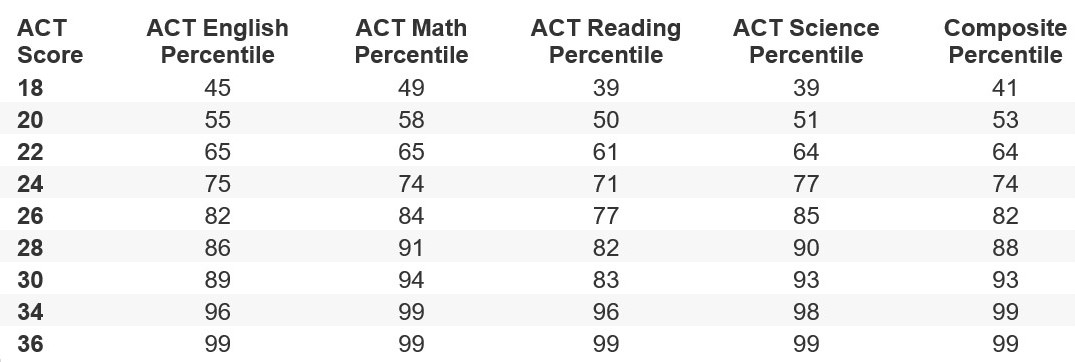What is a Good Score on the ACT?

What is a good ACT score? It’s a question many college applicants ask, with an answer that depends on several factors, like the college in question, and the strength of each applicant’s application as a whole. The average ACT score is 21. The perfect ACT score is 36. Anywhere in between can be considered good.
Most importantly, a “good” ACT score is one that gets you into the institution you want to go to, into the program you want to join, and helps you get some extra financial aid if you need it.
I know, I know, obvious, but the point is if you struggle with standardized testing (and you’re definitely not alone), getting anything above a 20 may be a total success, while others may have different expectations. While “good” is subjective (and is more of a philosophical question than one with a hard and fast answer), we can definitely talk about averages.
How is the ACT Scored?
Knowing what’s a good ACT score starts with knowing how the ACT itself is scored. As many readers already know, the ACT is scored on a scale of 1 to 36: 1 being the worst score possible and 36 being a perfect score. This final number is obtained by taking the average of each of the ACT’s four sections (math, scientific reasoning, reading, and English), which are also graded on a scale of 1 to 36.
But what do these numbers mean, and how are they determined? Each number on the scale corresponds to the number of questions you got right within a section. (You are not penalized for wrong answers on the ACT.) Once scores from all test-takers are gathered in a given year, percentiles are determined for each score value on the scale.
Per recent data from the ACT, the 50th percentile (a score better than half of all scores) landed at 20.8. (This number may shift slightly from year to year.) That same year, a score of 24 sat just ahead of 74% of all test takers. A 30 was higher than 93% of scores, and a 35 or above was good enough for the 9th percentile.
ACT scores follow a normal distribution, which means that most scores tend to land fairly close to the median score or the average score. Significantly fewer ACT test takers score near the extremes on either end.
What is the Average ACT Score?
Nationwide, the average ACT score is 21 out of a possible score of 36.
We can break it down even further to the average individual scores for each section of the test, which are all clustered pretty closely together:
English: 20.3
Math: 20.7
Reading: 21.4
Science: 21.0
This leads to the overall average ACT score, or composite score, of 21, which is more often than not all that colleges care about.
Good ACT Score Listings for Popular Schools
One of the most important factors in determining a good ACT score is comparing it with scores typically accepted by the colleges you’re considering. The more competitive a college is, the higher the bar will be for accepted ACT scores. Some of the most prestigious schools in the nation have student bodies with average ACT scores above 30. On the other hand, less competitive schools may accept lower scores. Check out the chart below to view average ACT score listings for schools around the nation.

How to Determine the ACT Score You Need
Now that you have your scores and have an idea of the average, let’s delve into what you should do now. Your plan of attack should include narrowing down your list of colleges, studying hard for the ACT, and scheduling at least one ACT test. While you may not be happy with your initial score, the good news is that you can take the ACT several times — and you only need to apply with your best score.
First, step one. Take a look at your college list and check out the average ACT score of accepted students (which, hint, hint, you can find right here on our college profiles), and see what their 25th and 75th percentile scores are.
Next, it’s time to study. It’s a good idea to think of ACT as an extra class. After all, the grade you get can greatly influence where you go to college. Some students get tutors, while others invest in practice books and take several practice tests to up their scores. As we mentioned above, you can also take the ACT more than once and submit only your best score (since colleges only request one).
The general correlation between you and your chances of admission is the closer your score is to the 75th percentile, the better of a match you and the institution make. There’s a lot more to take into consideration, though, and we’re here to make it as easy as possible.
Introducing: What Are My Chances?, what we here at Cappex affectionately call WAMC (wham-see). Basically how it works is the more information you input into your Cappex profile (like your test scores, for instance), the better we can estimate your odds of matching with a specific institution.
Know where you stand
See your chances of getting in at any college — in realtime. Get insights into your target, reach, and likely schools.
Learn More & Take the Next Step With Cappex
Still wondering “what is a good score on the act?” Want to get started with WAMC? No matter what your college-related needs are, Cappex has answers to help you. Get started today!